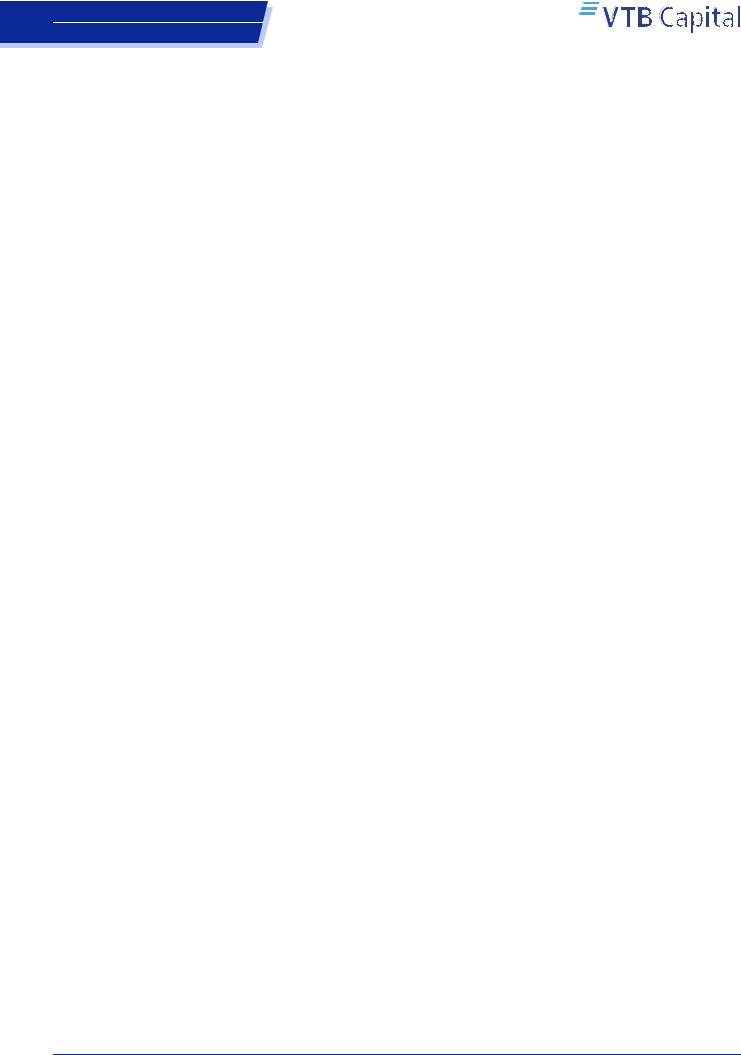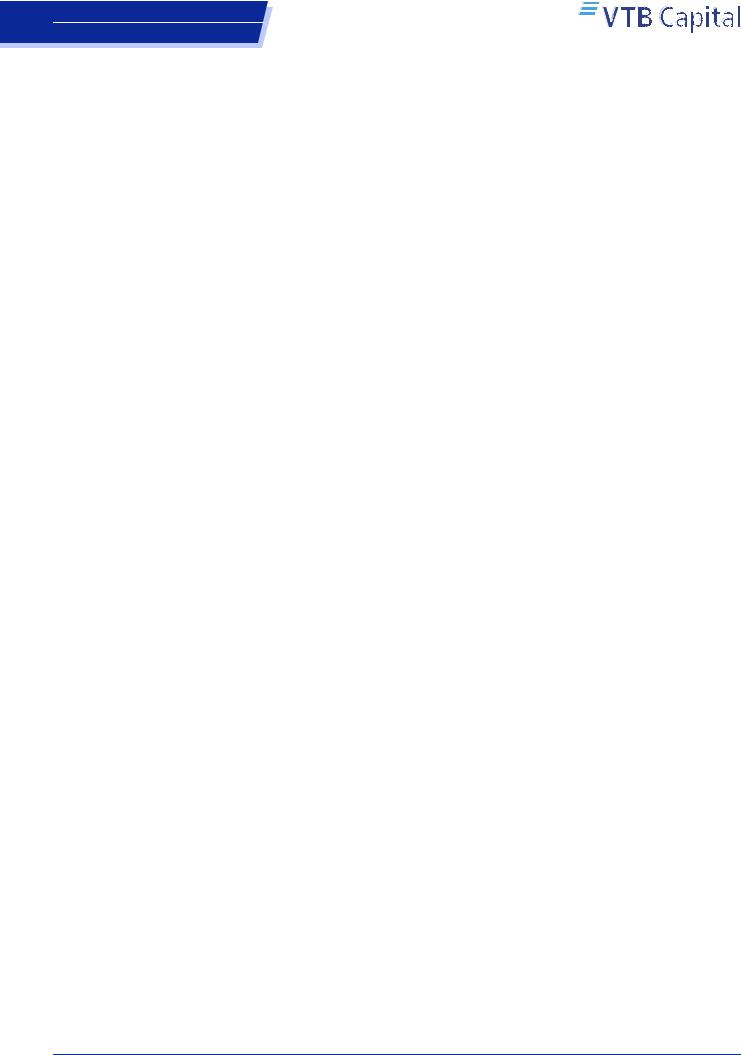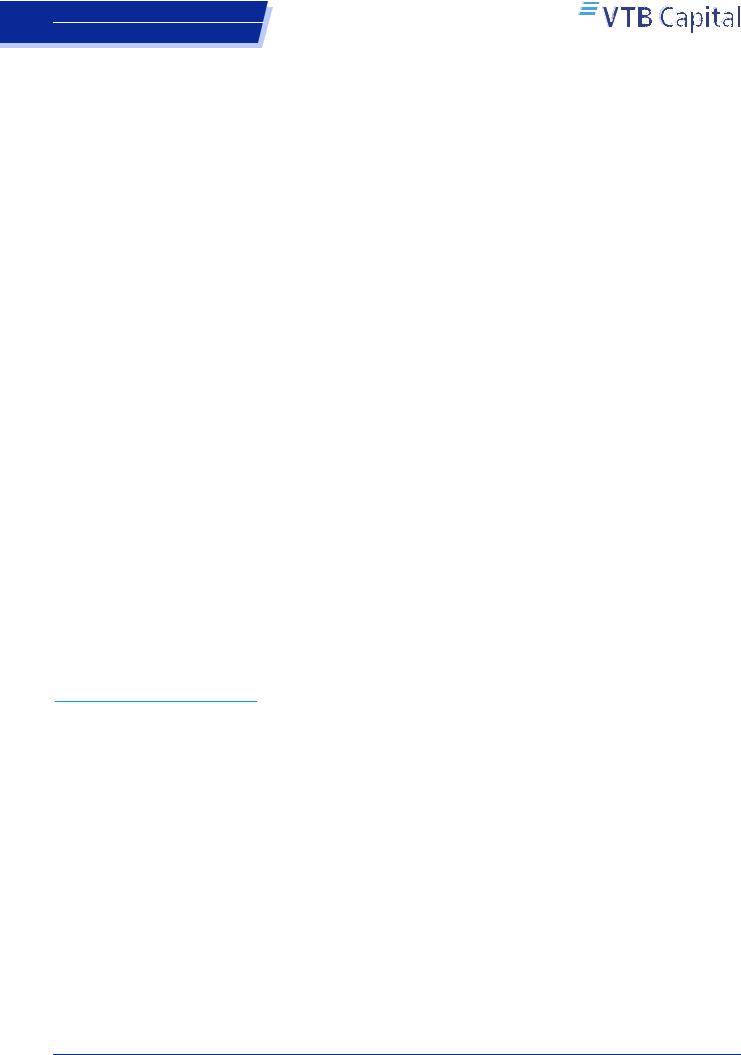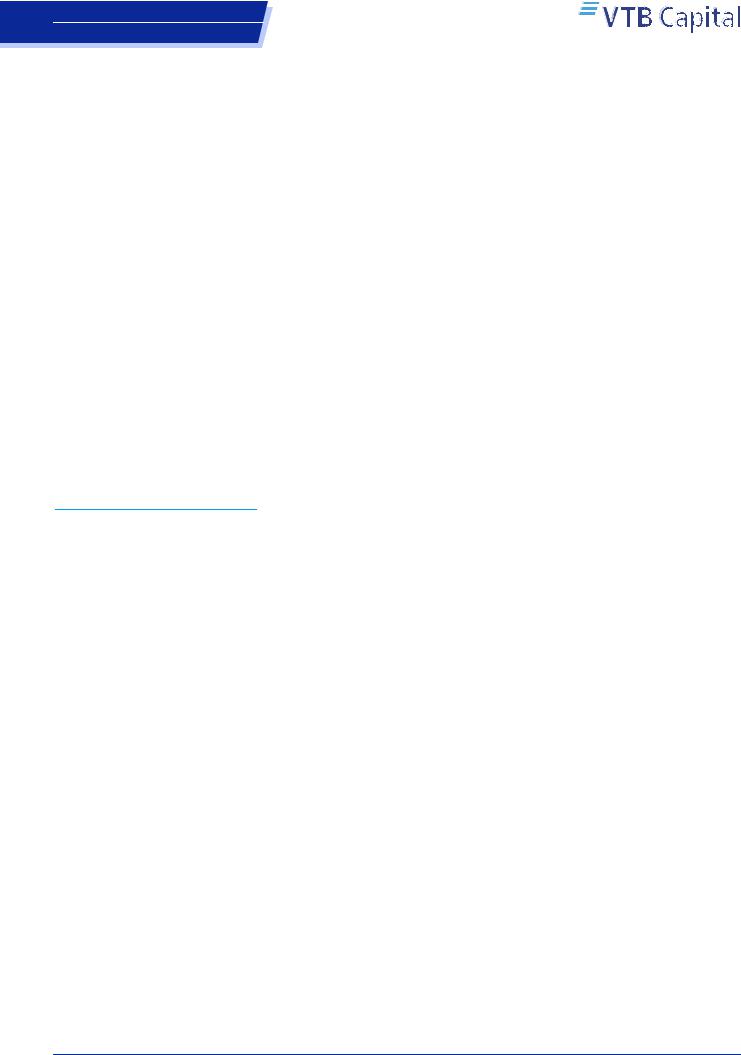
- •On Markets
- •In Russia & the Near Abroad
- •On companies
- •Investment views updated this week
- •Earnings and operating results this week
- •In focus
- •Also in the news
- •Around the Globe
- •In focus
- •Also in the news
- •Most/Least Liked Stocks (MLLS)
- •Historical performance
- •What we are changing this time
- •To the ML basket
- •Appendix
- •Disclosures
- •Production and Distribution of VTB Capital Research Reports outside the United States
- •Distribution of VTB Capital Research Reports to Investors within the United States
- •Relationship between VTB and Xtellus
- •Conflict of Interest Disclosures.
- •Issuer Specific Disclosures
- •Analysts Certification
- •Investment Ratings
- •12-month Target Prices
- •Conflicts Management Arrangements

vk.com/id446425943
Russia
Equities
Oil Sector – Oil price fall, of 13 November, by Dmitry Loukashov et al
Luxoft – Upgrade to Buy; still facing challenges, but recent correction overdone, of 16 November, by Vladimir Bespalov et al
Mosenergo – 9mo18; here comes the loss, of 13 November, by Vladimir Sklyar et al
Unipro – 3Q18 IFRS; one more year, please, of 13 November, by Vladimir Sklyar et al
Inter RAO – 3Q18 IFRS; all that cash, of 15 November, by Vladimir Sklyar et al
Week Endnotes
On companies
Our fundamental ratings and 12-month Target Prices for the stocks are contained in Figure 7.
Investment views updated this week
Recommendation changes
Russian oil stocks have thus far been resilient amid the -20% drop in Dated Brent, but we believe that the safety cushion in these stocks’ valuations has now been exhausted and do not anticipate them resisting further oil price pressure. Our ‘inside out’ approach does not raise an ‘undervaluation’ flag for the oil industry in general, or for any specific stocks in particular. Incorporating the current futures curve into our standard DCF-based valuation framework resulted in decreases of 7-23% to our 12-month Target Prices, and recommendation downgrades for Gazprom Neft and Lukoil (from Buy to Hold), and for Tatneft ords (from Hold to Sell).
Luxoft’s 2Q19 (ended 30 September 2018) results beat the consensus on profitability, but the company’s inability to reignite growth – implied by its guidance for 3Q19 (ending 31 December) and the overall outlook for 2H19 (ending 31 March 2019) – likely led to the stock’s 14% decline yesterday. We see this as an overreaction, as a few fresh challenges hardly imply such price moves. Having fine-tuned our model, we leave our 12-month Target Price of USD 50 unchanged, which implies an ETR of 50%. Thus, we see the recent share price decline as an attractive entry point and upgrade the stock from Hold to Buy.
Mosenergo’s era of profitability slippage has officially started, in our view, heralded by the publication of its 3Q18 IFRS financials and the net loss they contained. With a 71% combined bottom line decline until 2021F, per our forecasts, the best times for the story look to be gone for some time, and dividend growth never materialised, remaining at a muted 25% payout. We roll forward our model into 2019F and derive a new 12-month Target Price of RUB 1.55, lowering our recommendation to Sell.
12-month Target Price changes
Unipro’s 9mo18 results were, as we had expected, optically weak. Despite the Berezovskaya project being on track, 2019 looks trigger-less, with the same dividend and broadly flat profits before the spike we anticipate in 2020. We roll our model into 2019F, adjust forecasts for reported numbers and operational data and derive a new 12-month Target Price of RUB 3.16, implying an ETR of 22%; Buy reiterated.
How much is InterRAO worth if you assume its entire balance sheet cash position disappears? And what about using the same approach for future cash flows? What is the market pricing in, and what is it not, with the year-long share price hovering near RUB 4? In this report, we review the company’s 3Q18 numbers (strong), and try to understand what scenario investors are pricing in. Our new 12-month Target Price of RUB 8.40 justifies a reiteration of our Buy recommendation. We continue to see InterRAO as the best proxy of Russian utilities.
16 November 2018 |
4 |

vk.com/id446425943
Russia
Equities
O’Key – 3Q18 trading results; weak – revenues decline 10.7% YoY – 2.4% YoY correction on the adjusted basis
– vague prospects for a recovery, of 14 November, by Maria Kolbina et al
Index Watch – MSCI EMxCN November Review, of 14 November, by Ilya Piterskiy et al
Week Endnotes
Earnings and operating results this week
A list of the 3Q18 operating and earnings reports published by our teams can be found in Figure 4. For the compendium of the VTB Capital 3Q18 earnings season preview, see our Earnings Watch – 3Q18 earnings preview.
3Q18 earnings season – bright result of IT names. Qiwi showed a strong set of 3Q18 numbers, beating consensus expectations, and upgraded its FY18 guidance. Payment Services growth has accelerated, with the E-commerce and Money Remittances verticals as the main drivers, while Tochka improved its performance in 3Q18. Luxoft’s 2Q19 (ended 30 September 2018) results beat the consensus on profitability, but the company’s inability to reignite growth – implied by its guidance for 3Q19 (ending 31 December) and the overall outlook for 2H19 (ending 31 March 2019)
– likely led to the stock’s 14% decline. Gazprom Neft’s numbers were strong and above our forecast and consensus estimates in all three lines. The key discrepancy to our forecast came from better than expected tax reliefs in the upstream segment. FCF was also strong and above our forecast. In the meantime, Gazprom Neft’s BoD recommended that shareholders approve dividends for 9mo18 of RUB 22.05/share, according to Interfax. Rusagro released strong 3Q18 financial results, the first display of the company’s performance since the normalisation of supply-demand in the sugar market. Consolidated EBITDA surged +42% YoY, meeting the robust estimates set by us and the consensus. We note that the improvement of the sugar price (OctoberNovember up +20% QoQ) is yet to appear in the IFRS numbers and is set to support the financial results in the next several quarters. During the conference call, Rusagro said that it saw a number of opportunities (organic and M&A) and could consider a SPO in 2019-20. TMK’s revenue and EBITDA were weak and close to our forecast and consensus. Below the operating level, the company reported a significant loss related to the disposal of its production subsidiary in the Sultanate of Oman. Therefore the company's bottom line dropped to negative territory. Inter RAO offered strong 3Q18 IFRS numbers. Unipro’s numbers were optically weak, as we had expected. Mosenergo’s earnings were in negative territory, with a net loss in 3Q18. FSK released its 9mo18 IFRS results, with almost flat adjusted EBITDA of RUB 101.7bn, along with a total net income improvement of +11% YoY, reaching RUB 58bn. We consider the results as decent, as the key take away is that the bottom line expansion creates a solid base for a repetition of last year’s dividend.
O’Key has released its 3Q18 trading results. Revenues declined -11% YoY to RUB 36.5bn. Headline LFL was down -6% YoY, reflecting a 2.0% ticket correction and 4.0% YoY traffic outflow. The weak results reflect the disposal of the supermarket business, pressured household budgets, intensifying competition for hypermarket operators, low inflation and less effective promos. Adjusted for the sale of the assets, the top line lost 2.4% YoY, implying a comparable pace with the previous quarter. Management guided for ten openings in the discounter format for 4Q18, which would bring the annual figure to 15 in 2018 (vs. the original target of up to 25).
In focus
The MSCI has announced the results of its November Semi-Annual Index Review. Overall, in our deck of 23 countries (EM ex-China) there were 37 exclusions vs. just 13 inclusions. All changes are to be effective after the close of trading on 30 November. POLY RX was the only inclusion across CEEMEA. Also, among Russia stocks, HYDR was excluded.
16 November 2018 |
5 |

vk.com/id446425943 |
Week Endnotes |
Russia |
|
Equities |
|
Alrosa – Melee diamond market weakness spreads as De Beers cuts prices, of 13 November, by Dmitry Glushakov et al
Alrosa – 10% cut in prices for smaller stones in November – 4% downside risk to 4Q18 EBITDA, of 14 November, by Dmitry Glushakov et al
Alrosa – October sales at USD 243mn – down 28% YoY, of 12 November, by Dmitry Glushakov et al
Alrosa – company considering purchasing new deposit in Angola – in line with long-term plan – project at an early stage – neutral, of 15 November, by Dmitry Glushakov et al
Alrosa – sells its share of the Botswanan asset at a nominal price – neutral, of 16 November, by Dmitry Glushakov et al
Moscow Exchange – MOEX wins cassation: important precedent for NCC and 4% earnings relief, of 15 November, by Mikhail Shlemov et al
RusHydro – dividends could become less volatile – strongly positive, if it materialises, of 13 November, by Vladimir Sklyar et al
RusHydro – moving forward with its Russian Far East modernisation projects, of 14 November, by Vladimir Sklyar et al
RusHydro – assessing the reconstruction of Zagorskaya GAES- 2 – neutral, of 16 November, by Vladimir Sklyar et al
Bloomberg reported a decrease of melee diamond prices by -10% by De Beers. The news highlights ongoing weakness in demand for lower-priced stones (20% of revenues and 40% of volumes for Alrosa). According to Interfax, Alrosa cut its November prices of smaller stones, reacting to the De Beers price decrease for stones of the same category. The company has also limited the sale of smaller stones to support prices. On our numbers, this decision carries a 4% EBITDA downside risk for 4Q18F. Alrosa’s sales in October were USD 243mn, including rough diamond sales of USD 234mn and polished diamond sales of USD 9mn, the company announced in a press release. According to a comment by Deputy CEO Yury Okoemov, the demand for smaller stones continued to remain weak in October, due to the seasonal slowdown, but is expected to stabilise in December 2018-1Q19. In the meantime, according to Interfax, Alrosa is looking for a new deposit in Angola for its Kimang joint venture. The company’s specialists have inspected the Sombo land area and plan to obtain a geological exploration licence for it in the coming months. As soon as the company obtains all the required permissions, it plans to start field work. The company estimates the project capex to be at least USD 5m. The news is in line with Alrosa’s strategic priority to increase production in Angola in the long term. The future effect on the company’s fundamentals would depend on the outcome of the geological exploration and a more precise capex estimate. In other headlines, Alrosa has sold 50% of its Botswanan asset, the Sunland Minerals joint venture, to Botswana Diamonds, which became the sole owner of the joint venture, according to Interfax.
Moscow Exchange (MOEX) won a cassation against the previous court decision, which might result in a provision release of RUB 874mn (4% of BBG FY18 consensus as of 14 November 2018), which is zero cash based and therefore is going to be returned in full. We see the court's decision as an upside risk for the company's FY18 dividend (BBGe RUB 8.10 DPS, implying a 90% DPR). It is also worth noting that this is an important legal precedent for NCC, reducing the operational and counterparty risk of the clearing / central counterparty business, in our view.
Kommersant reports that RusHydro’s dividend policy could be adjusted from the current 50% payout of nominal IFRS net income to reduce the effect of non-cash items. According to the article, one proposal is to establish a floor for dividend payments that could be represented by the average dividend payment in the last three years prior to the period in which dividends were accrued. This implies that RusHydro’s annual dividend is to be the higher of the three-year average and a 50% payout of nominal IFRS net income. The article also claims that the updated dividend policy could be approved as early as the end of November. Meanwhile, Interfax reported on 13 November that RusHydro had plans to commission Khabarovskaya CHP-4 in 2023 and Artemovskaya CHP-2 in 2024-25. Both projects are set to replace old units which are going to be decommissioned. RusHydro expects it to take 15 months to finalise the project details and has already launched the auction for the project developer. Both the Khabarovskaya CHP-4 and Artemovskaya CHP-2 projects are part of the fleet that RusHydro is willing to make part of the Russian Far East modernisation within the DPM-2 mechanism. In other news, Interfax reported, citing two sources close to RusHydro, that the company was considering reconstructing Zagorskaya GAES-2 but that no final decision had been taken yet. According to the article, the company is assessing whether to pour cement under the basement that sunk as a result of the accident, as studies show this could be a potential solution. Before the accident, the company had spent RUB 70bn on the project. It has received RUB 8.2bn in insurance and the current investment programme envisages conservation costs of about RUB 3.5bn for 2018.
16 November 2018 |
6 |

vk.com/id446425943 |
Week Endnotes |
Russia |
|
Equities |
|
Aeroflot – Higher competition? Not really, of 13 November, by Elena Sakhnova et al
Gazprom – close to completing the offshore part of Turkish Stream – official completion planned for 19 November – commissioning slated for the end of 2019, of 16 November, by Ekaterina Rodina et al
Polymetal International – Investor Day 2018 II; slightly positive as guidance conservative, of 13 November, by Dmitry Glushakov et al
EVRAZ plc – starts upgrading Tashtagol mine – RUB 6.8bn capex – possibility of new plant being constructed – capex upside risk, of 14 November, by Dmitry Glushakov et al
EVRAZ plc – Raspadskaya preliminary production guidance for 2019 is 13.3mnt of coal, of 15 November, by Dmitry Glushakov et al
Severstal – reconstruction of converter #3 at the Cherepovets Steel Mill, of 15 November, by Dmitry Glushakov et al
MMK – minority shareholders of Belon file lawsuit claiming RUB 10.7bn from MMK – court proceedings at an early stage – neutral, of 13 November, by Dmitry Glushakov et al
Retail and consumer – project to develop unified countrywide tracking system for food – implementation costs for business likely to be passed to end prices, of 12 November, by Maria Kolbina et al
Ural Airlines, the third largest airline in Russia, has received permissions to fly from Moscow’s fourth largest airport, Zhukovsky, to several popular destinations in Europe, including London, Prague and Paris. The company was not flying to Europe from Moscow previously. Ural Airlines’ new routes will not create competition for either the main Aeroflot business (due to their remote location) or Pobeda (due to much higher tariffs). If anything, it might create some competition to Rossia. The latter remains the most controversial part of Aeroflot’s business model for us, but it accounts for less than 10% of the group's EBITDA. On a separate note, Aeroflot CEO Vitaly Saveliev mentioned that the company had under-received RUB 55bn in profits in 2018 on high fuel and the depreciating rouble.
Also in the news
Gazprom is close to finishing construction on the offshore part of the Turkish Stream pipeline, Vedomosti reports. Official completion of this construction stage is planned for 19 November. The pipeline is slated to be commissioned at the end of 2019, after the construction of the compressor station and the onshore part of the pipeline in Turkey have been completed. The latter are on schedule, Vedomosti reports, citing Gazprom. Given that concerns over the regulatory approval for the project from Turkey have almost been eliminated and the project timeline is in line with the previously announced schedule, we deem the news as generally neutral for the name.
Polymetal’s second investor day in 2018 was slightly positive for the stock, in our view: the company confirmed Kyzyl’s upside potential and announced improved Nezhda NPV estimates. Still, when providing output estimates for 2019 onwards, management remained conservative, which might set the ground for expectations of an outperformance in the medium term.
According to Interfax, Evraz has started upgrading the facilities at the Tashtagol ore mine. The company expects production at the mine to increase from 2.2mnt to 3.25mnt (on an annual basis) in 2H19. Total investment in the project is RUB 6.8bn. In addition, according to a comment by management, the Board of Directors is considering the construction of a new plant to replace the existing one. However, no other details were provided. The project to extend the life of the Tashtagol ore mine has already been announced by Evraz. However, we await further information on the possibility of a new plant being constructed at the Tashtagol ore mine, which carries an upside risk to capex.
According to Interfax, Evraz’s subsidiary, Raspadskaya, has announced its preliminary production guidance for 2019, at 13.3mnt of coal. Management is to provide exact guidance for 2019 in December. Raspadskaya CEO Sergey Stepanov has also confirmed the company’s plan to produce 12-12.5mnt in 2018.
According to Interfax, Severstal has finished reconstructing converter #3 at the Cherepovets Steel Mill for a cost of RUB 277mn. This reconstruction is to minimise steel loss. Severstal plans to reconstruct two more converters at the mill by the end of 2019.
According to Interfax, minority shareholders of Belon have filed a lawsuit against MMK, claiming RUB 10.7bn in recovery of damages. The preliminary court hearing is set for 6 December 2018. To recap, in 2016 Belon was reorganised and its coal assets were transferred to MMK-Coal. Since the court proceedings are at an early stage, we treat the news as neutral. However, given the substantial size of the claim, it carries a negative risk for the company, were the claim to be satisfied in full.
Prime Minister Dmitry Medvedev has requested that a road map be developed for a unified tracking system for food in Russia. It could be implemented by April and collect data on food items from production to retail. The prime goals of the new system are to increase the transparency of the food segment in Russia, to improve the tracking of produce quality and to fight counterfeiting. It is to unify the multiple already existing watch systems and lower the number of government checks that are carried out. Although we do not anticipate the implementation of this system triggering material additional costs for key retailers and producers, those that there are could well be passed through to end prices.
16 November 2018 |
7 |

vk.com/id446425943 |
Week Endnotes |
Russia |
|
Equities |
|
O’Key - appointment of new Wholesale Director - across sector greater wholesale, of 13 November, by Maria Kolbina et al
Lenta – appoints new CFO, of 12 November, by Maria Kolbina et al
X5 Retail Group – planned expansion in Siberia, of 14 November, by Maria Kolbina et al
Healthcare sector – state chemotherapy funding to double YoY to RUB 153bn in 2019 – further strengthens one of the key growth pillars for private hospitals, of 16 November, by Maria Kolbina et al
Energy sector – Deputy Minister of Energy in charge of electricity Vyacheslav Kravchenko steps down
– negative, of 16 November, by Vladimir Sklyar et al
O'Key announced the appointment of Artem Taraev as Wholesale Director, reporting directly to the Group CEO, Armin Burger. Overall, Taraev has eleven years of experience in retail. From 2011, he worked in Metro Cash & Carry (as a store manager, head of field operations and regional manager for the Siberian region) and later joined K-rauta in 2014 as sales director (appointed CEO in Russia in 2016). Wholesale has become more important of late for all constituents in the retail listed universe (up to 2% of total sales). However, this is an emerging segment, with limited implications for the investment cases.
Last Friday, Lenta announced the appointment of Rud Pedersen as the new CFO, replacing Jago Lemmens. This appointment will take place once Lemmens has completed his notice period, but no later than 31 March 2019. Petersen has more than 25 years of experience, having held a number of senior management positions in various companies, including Cadbury, Astazeneca, Levi Strauss and IC Group. He is currently CFO of Carslberg Eastern Europe. Lemmens has worked in Lenta since 2010, and is stepping down due to family reasons. He is going to remain a full-time consultant for the company in order to support the new CFO during his transition process.
Ekaterina Poduto, the Head of the Commercial Department of the Siberia Region at X5 Retail Group, announced that the Pyaterochka chain (75% of X5 Retail Group’s revenues in 2017) was expected to increase its store count in Siberia 45% in 2019, with a 38% increase in its store count in the Kemerovo region. There are currently 435 Pyaterochka stores in the Siberia Region, or some 4% of all Pyaterochka stores (as of 30 September 2018). The projected growth implies a total amount of 196 openings, which would be 10% of the annual openings guidance provided by the company during its capital markets day.
According to data from the Oncology Association of Russia, the state funding of oncology treatment is going to go up +57% YoY in 2019 to RUB 217bn. State spending on chemotherapy is to double YoY to RUB 153bn. Cancer is one of the main focus areas of the government’s health initiatives with a target of reducing the mortality rate 6% by 2024 to 185 cases for every 100,000 citizens. Private healthcare providers have, of late, been actively participating in services under the mandatory health insurance scheme, as its premiums allow them to earn decent returns and improve utilisation rates. This improved financing could make the oncology segment a new growth pillar for private providers and we see it becoming an important revenue generator for MDMG at the growing Lapino cluster.
Kommersant and Interfax reported on Thursday that the Deputy Minister of Energy in charge of the electricity sector, Vyacheslav Kravchenko, had left his post. According to Kravchenko, he stepped down of his own initiative. Kravchenko’s role in the sector cannot be overestimated: he was in charge of the initiatives on grid reserve payments, and supported renewable energy schemes and the long-term tariff regulation for electricity grids. Most importantly, he was the architect of the modernisation programme for fossil-fuel generation, the so-called DPM-2 (which is still a project, rather than adopted legislation). His departure might further delay this fundamental piece of legislation while the general utilities-friendly stance of the regulations could start gradually shifting towards a more consumer-oriented approach, raising regulatory risks for the sector.
16 November 2018 |
8 |
